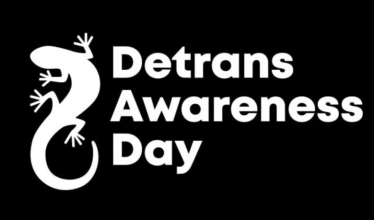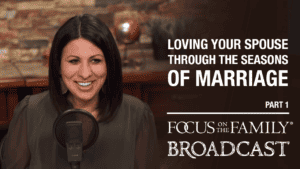Excerpt:
Walt Heyer: I was broken by having gone through this procedure, having taken hormones and having believed that going through this transition to a different gender was my salvation when in fact the salvation is actually in Jesus Christ.
End of Excerpt
John Fuller: That’s Walt Heyer from our last episode of Focus on the Family with Jim Daly. And he’s back again today, along with Kathy Grace Duncan, and they’re gonna be sharing their very powerful stories of God’s work in their lives. Uh, thanks for joining us today. Uh, this is a topic that’s going to be pretty sensitive. Uh, so please, uh, just know that it isn’t appropriate for younger listeners and viewers.
Jim Daly: Uh, John, last time we covered, uh, amazing components of these two wonderful, uh, people’s testimony and it was tough, you could hear it. And there was some gold nuggets in that discussion that really jumped out at me. And if you missed hearing last time, download the smartphone app and get a copy somehow. We’re… here at Focus, uh, we can give the details later. You can get a CD if you still use CD players, whatever it takes. We want to get that message into your hand because I think it was powerful. Some might be asking, you know, why is Focus covering this? Well because many people are struggling in this area. Maybe not directly themselves, but family members are, and people are writing and emailing and texting us about circumstances in their own family dynamics, where a niece, a nephew, a son, a daughter, whatever it might be, they’re struggling with this and they don’t know what to do. So, in part, this is to equip you to better understand this world, to better understand it biblically. What does God have for people who are struggling with their sexual identity, their orientation, all of it? And, uh, this will be a great tool in your tool chest, uh, to understand it and talk to others about it.
John: Yeah. And Focus is here to help you grow in that understanding. And we have so many resources, including one that we’re making available today. It’s a book by Vaughan Roberts and it’s called, Talking Points: Transgender. And for details, you can give us a call, 800-A-FAMILY or visit focusonthefamily.com/broadcast. And Walt Heyer identified as a transgender woman for eight years. And he’s now an author and speaker and travels extensively sharing his story of redemption. Kathy Grace Duncan identified as a man for 11 years, and now she volunteers with Portland Fellowship and helps men and women struggling with their sexual identity. And she’s also part of the “Changed” movement.
Jim: Let me welcome both of you back to Focus on the Family.
Walt: Thank you.
Kathy Grace Duncan: Thank you.
Jim: You know, it was really enlightening, informative, heartbreaking, all of those things, uh, last time we got together and talked about your situation and I’m just so grateful right at the beginning here that the Lord has done such a transformation in your lives. Kathy Grace, uh, let me give you a shot at, um, I think speaking to those people who discount who you are, your journey, et cetera, um, there seems to be such a venom if I could say it that way. Not from everybody, there’s not a monolithic kind of situation or status for these people that don’t believe what you believe that you can come out of being homosexual, you can come out of trans gendered ism, um, but give it your shot to say, here’s why you need to listen to me.
Kathy Grace: Sure. Well, I did have a conversation with, uh, a younger gentleman. Uh, I had spoken at a conference and he approached me and he’s like, “You know, I, I don’t see how coming out of this would be better, you know, because I’m tremendously happy.” And I said, “I understand that I was tremendously happy too.” “Well, did you have friends?” I’m like, “Absolutely I had friends.” And he goes, “Well, you didn’t have surgery.” And I said, “Well, I had the top surgery, but, you know, I didn’t find it necessary nor did I have the money to do the bottom. But yet I still went through the effort to continue to live as a man.” And he’s like, “Well, but are you happy now?” And I said, “Absolutely. “And you have friends?” And I’m like, “Yeah.” And he said, “So what’s the difference between you and I?” And I said, “Well, the differences is that I’m no longer deceived.”
Jim: Wow.
Kathy Grace: And he-
Jim: That’s a big statement.
Kathy Grace: And he’s like, “Well, but I’m, I’m happy and I love the Lord.” And I’m like, “Okay, well, let’s do this. Let’s take the sexual component out of it. And let me ask you, do you believe that when you sin that the Lord still loves you?” And he’s like, “Well, no, because I sinned, I’m dirty. I’m bad.” And I said, “Well, but that’s not what the Bible says, you know?” And I said, “So if you believe that the Lord doesn’t love you, you know, but you believe in his unconditional love, then you’re deceived because he loves you no matter what.”
Jim: Right.
Kathy Grace: And he’s like, “Oh,” and I said, “And so when I came to believe that the Lord loved me, I understood that I was deceived.”
Jim: Yeah.
Kathy Grace: “And that’s the difference between you and I is that you don’t know the deception that you’re in. You don’t understand that.” And he’s like, “Oh.” And I said, “So I’m still happy living in the truth with who I am. I still have friends. My life is fruitful. It wasn’t fruitful when I was, cause I lived under fear. And I see that now the fear that I lived under.”
Jim: Let, let me bring up another aspect Walt, you’ve studied this.
Walt: Mm-hmm.
Jim: When you look at the psychological factors related to transgenderism and other things-
Walt: Mm-hmm.
Jim: Um, despair, anxiety, depression seem to be a common component within that community. Describe what you have found.
Walt: Yeah, depression and anxiety are just kind of one basic component of struggling with your identity. You’re going to be anxious about it. How soon can I get it done? You’re going to be depressed about who you. In fact, gender dysphoria is just the opposite of euphoria, which is just a form of word of depression. And so what I’ve found in the people that I’ve worked with, and that’s, basically the group that I can talk about is that they either like Kathy Grace has talked about, they were sexually abused, they were emotionally abused. Um, some of them were passed around from foster home to foster home. They had something in their life that caused them to really not connect with who they were. They didn’t have a father figure. Something happened and, and there’s really a number of things that happened to them. Some of them have body dysmorphia, dissociative disorders, schizophrenia, bipolar disorder, obsessive compulsive disorder. And so, the people who are identifying, uh, many of them as transgender are suffering from what we call co-morbidities and it’s digging down and finding out what those comorbidities are. And that’s where we begin to uncover these comorbid disorders such as dissociative disorders and all these other things that come into play and sexual abuse being one of the big ones like Kathy Grace has found as well as I have.
Jim: Yeah. Hey, Kathy, uh, let’s turn the corner, let’s get to the healing part. Yeah. We left off last time, uh, you were basically playing two roles. Uh, you were that teenager, you were presenting in some circumstances male and even dating girls. And then you also had a female role in some other contexts. Take us forward in that. Um, where did that lead, what was happening in your 20s and then what happened to you at 26?
Kathy Grace: Sure. So, um, at the age of 19, I di- I couldn’t do the dual, uh, role any longer-
Jim: Just exhausting or what?
Kathy Grace: It was. Well, and I just desired for this freedom to live as a man.
Jim: What, what does that mean though? I mean, what, what did it mean to become free? What were you looking for?
Kathy Grace: Well, I was… Because of the deep self-hatred, I was so desperate to get away from anything that represented me as a woman. And so, I began to pursue the hormone treatment so that I could become and live as a man. And so, at the age of 19, I did that. I changed my name, started the hormone treatment and began to live as a man from that point on, at the age of 19.
Jim: Yeah. And you rolled forward through your twenties?
Kathy Grace: Mm-hmm. And-
Jim: Doing that.
Kathy Grace: Yes. So, two weeks after starting to live as a man, I had gone to church and I accepted the Lord (laughs) as my savior, oddly enough. However, um, being so young in my faith, I didn’t know what his will was for my life-
Jim: Right.
Kathy Grace: And I didn’t hear him telling me that what I was doing was bad or change back. So, I thought He was okay with it.
Jim: Uh-huh.
Kathy Grace: And so, I continued to live as a man.
Jim: And how, how did that then unfold? Um, did you feel contradictions? Uh, how did you become aware that maybe I’m not living a full Christian life and I got to deal with this?
Kathy Grace: Um, that conviction didn’t really come until almost the end of the 11 years. However, um, during that time, you know, I, I dated women and I got out of a one long-term relationship and I jumped right into another. And after being in this relationship for about a year, I woke up one morning and realized, Oh my gosh, she’s my mom and I’m my dad. You know, I’d become everything I vowed that I would not. And so, I broke up realizing I can’t, I don’t want to be this person. I don’t want to be that man and I don’t want to treat her like that. So, I broke up with her and I had been involved in a church and I played in the orchestra. And one night on my way to the orchestra practice, the Lord called to me. And he said, “Will you now? Will you now?”
Jim: Okay.
Kathy Grace: And I said, “Yes, Lord.” You know, I take this inventory of my life and I’m like, I don’t have anything in the way. I have nothing holding me back. And prior to that, I had fallen into a deep, um, pornography addiction. It was severe. And three months later after saying yes to the Lord, answering that call, I realized that I had been delivered from that pornography addiction and then continuing moving forward. So, I was 26 at the time and in the next four years, the Lord just began to woo me. And I opened my heart everywhere to him. I got more involved in the church. I was a junior high, um, boys, small group boy’s leader and I led a men’s small group and I still in- involved in the orchestra. And, you know, I just poured my heart out for the Lord and doing his work. And then at the end of the 11 years there, um, I had come back from a high s- uh, junior high retreat and the Lord had given me spiritual parents, and my spiritual dad came up to me and said, “Hey, can we talk to you?” And I, in my heart, I was like, Oh, I know that this is not going to be, you know, I’m going to be confronted here. And, uh, so I go back into the, the prayer room and, uh, a pastor that I’d become really good friends with was back there. And I sat down, and he looks at me and he said, “You know, we’re, we’re hearing these rumors about you and we just want to know who are you? Who are you really?” And, uh, for the first time I told the truth, because prior to that, I would say, I’m a man who used to be a woman. And at that point, I said to the pastor, I’m a woman living as a man. And when I did that, the Holy Spirit just blew into me.
Jim: Wow.
Kathy Grace: And I saw the next two weeks of my life. And I realized in order to have this relationship that I had so begged the Lord for, that I had to go back to being a woman. And that was plan A. There was no plan B, there was, this is what I’ve got to do. Dave, I asked Dave the pastor, “So what do I do?” And I hadn’t told them anything that I had just seen. And he said, “Well, you know, you could, uh, you could, well, um, maybe you should, uh, yeah. Um, uh, yeah-”
Jim: Right.
Kathy Grace: I don’t know.” (laughing).
Jim: No kidding.
Kathy Grace: He’s like, I never dealt with this before.
Jim: Right.
Kathy Grace: And I said, “Well, can I share with you what I’ve seen?” And he’s like, “Sure.” So, I said, “Well, in the next two weeks, I need to go to these different pastors, and I need to step down from my roles. I need to, you know, go back to live as a woman. I need to go out and break up with my girlfriend.” And, and he’s like, “Okay, well, I’ll work with you. I will meet with you and I’ll, I’ll be in those meetings to, you know, meet with those pastors to step down.” And, um, that was the point where I totally just gave my heart over (laughs) to the Lord and said, yes.
Jim: Yeah. You know, and it’s so powerful and I appreciate the pastor’s, um, inability in, in some ways, ’cause this isn’t something we experience that often. And frankly, um, this is the big point. This is maybe something I would like to ask you and that is when we are pushing for the change, you know, if that pastor would have said, “Yeah, we’d been on this, you know, we’ve noticed that you’ve needed to change for quite some time. Here are the four things you need to do.” I doubt that would have resonated with you, frankly. And it’s almost like it has to be from within you. The Holy spirit has got to quicken you to say, even what this person in front of you is saying is true-
Kathy Grace: Mm-hmm.
Jim: Right. And there’s gotta be that connection.
Kathy Grace: Absolutely. Well, and I think too, just allowing the Lord to come into your heart, even when you know, there’s places I know that I’ve been in sin and the Lord begins to work on that place. And he begins to bring healing. I, I realized, Oh my gosh, this isn’t okay.
Jim: Yeah.
Kathy Grace: And prior to that, in that four-year period where the Lord was wooing me, there’s a couple of times where scripture actually brought conviction and I wasn’t quite sure what to do with that. And I had a friend call me, um, you know, she was crying over the phone ’cause she had read Psalm 139 and she was like, “Oh my gosh, the Lord knows me.” And, you know, she was so excited and, and I’m like, “Oh no, what have I done? If he’s knit me together in my mother’s womb, what have I, what am I doing? What have I done?”
Jim: Walt, uh, parlaying this now into your direction-
Walt: Sure.
Jim: To get your part of the story, ha- where are you picking up some spiritual sense that, is there really a God, you know, here I am living as a woman, I’ve gone to the full degree of physically changing myself to be that, but it’s not real.
Walt: Yeah. Well, when I went to church, I first went to pastor Jeff Ferrara and I sat in his office across where I meant. And as Laura and I just come out of a recovery home from alcohol and drugs and I’m sitting there and, and I’m looking him straight in the eye and say, “Jeff, are you going to try to change me back to being Walt?” And Jeff in his style, he’s twirling a pencil in front of him. He said, “No.” He said, “My job is just to love you and it’s God’s job to change you.”
Jim: That is powerful.
Walt: And see that right there got me, my eyes popped open.
Jim: Yeah.
Walt: ‘Cause you expect him to say something else.
Jim: Yeah.
Walt: And so in that time that I spent, many, many, many times with Jeff, what I realized was that in speaking and learning from Jeff, there’s only two ways to be in this as, for me was I was either going to be defiant against Jesus Christ being able to redeem and restore my life. Or I was going to admit that I was broken, and that’s what I wrote in my book about my brokenness. And once I realized that the surgery and the hormones, and none of that changed me, that was the key that opened the door that said I’m broken. That was the brokenness. I had been broken by the surgery and the hormones. And at that point I then had an open heart for the Lord to come in and redeem and my- restore my life. And so, this is where I began the journey back. I’m recovering. I’m, I’m working on my alcoholism and, and during a time when I’m meeting with somebody doing my four step and you’re going through all this stuff with my psychologist, who is a Christian psychologist and, and we’re praying and going through it, and for almost two hours I believe, we went through the session together, going through all these different things. And when we were done having the session, I had written them all down on a yellow line piece of paper, all the things that hurt. The, the sexual abuse, the purple dress, all these things I’d written down. We went outside and lit a match to them in the parking lot.
Jim: It was like a hundred pages, correct?
Walt: Yeah. Yeah. It was big giant thing. And I’d just written everything down and wanted just regurgitate all of it and get it out there. I had no idea what was going to happen that day.
Jim: Wow.
Walt: So, we lit a match to the corner of this yellow line paper and let it burn. And it just took away and went, drifted it smoked and it was gone. And so, my counselor at the time said, “You know, I think we should go back to the office and pray.” Well, you know, I knew this guy was a guy who prayed for a long time. And I thought, I don’t know if I want to go back and listen to this guy, pray, ’cause he’s going to go on for two hours. I want lunch. I’m tired of doing-
Jim: So, you’re back to practical.
Walt: I’m back to practical. You know what I’m thinking? If you could do two minutes of prayer, I’m good. But I knew it wasn’t going to be. So, we went back, and he started praying and I’m thinking, “Oh God, how long is this going to go on?” And he kept praying and he’s praying and I’m going, “Oh my gosh, he’s praying forever.” And it was starting to become almost comical to me. How long is this guy going to go on? I just spent two hours with him. And so, all of a sudden, I didn’t hear him anymore. It just got silent. And I know he was still praying, but I, I could see the Lord coming to me. Uh, I saw him coming down toward me and I stopped for that moment. I didn’t hear anything. And I looked in front of me and here was a little baby wrapped in cloth in front of me. And I looked at the baby and said, “That’s me. That’s me.” And the Lord is coming down to pick me up. The Lord reached down and picked that little baby up. And I could hear him say, “You are now safe with me forever.” And he disappeared.
Jim: Wow.
Walt: My life at that moment was redeemed and restored to Jesus Christ. In that prayer that I did not want to have-
Jim: Yeah.
Walt: That was going to be longer than I wanted to be there. The Lord came.
Jim: Yeah.
Walt: And from that moment on-
Jim: Wow.
Walt: I’ve been serving the Lord through that redemption that happened that day-
Jim: That’s so beautiful. And you know, the picture you paint there, that’s what the Lord wants with every one of his created beings, right? We’re created in his image. We’re created for relationship with him. That’s what he wants to do for each and every person, no matter what ensnares you in this life, he knows that he has compassion for us.
Walt: Absolutely. And the key though is admitting that I was broken.
Jim: Yeah.
Walt: See, as long as I held onto the fact that I was okay the way I was, he wasn’t going to come.
Jim: Walt, you strike me as a truth seeker. Not everybody is. And all throughout our conversation, you seem to have a good bedrock of heh, I don’t want to listen to this prayer forever. Come on. I mean, that’s a very practical thing, a very truthful thing to feel and to say, and you strike me as somebody, even back when, when you were living in a transgendered environment, you strike me as somebody who wanted truth. That’s an actual, uh, benefit in your pursuit of God. People need… My experience is the more you try to pursue God, the more you need to know what truth is, right? You start, it’s revelation to you that I’m living a lie, whatever it might be. I’m a married man having an affair. I’m whatever. If you can’t get to the truth of what God is trying to show you, y- you’re going to swing and miss every time.
Walt: Yeah.
Jim: And many, many people with their sin live in that space because they can’t bring it into the light of Christ. H- what, where did you find that ability to want to be more truthful about who you were? You weren’t same-sex attracted as a transgender person-
Walt: Right.
Jim: But you were trying to get rid of the dirtiness of what you’d experienced.
Walt: That is a great question. And, and it happened really when I went to a gender therapist, the guy who actually wrote the original Harry Benjamin International Standards of Care that morphed into the standards of care we have today, Dr. Paul Walker, who was the chairperson who wrote the original standards of care in the late ’70s. And so, this wanting the truth came out of my time with him as being my therapist. And later on, as him being one of the ones along with the surgeon, Dr. Biber admitting that the surgery doesn’t change you. So, what I wanted and what came from this was I realized after the fact that had Dr. Walker sat with me and asked me the truth about what happened to me as a child. I told him about being sexually abused. I told him about, but he dismissed it as having any significance. And see, that’s the truth that was missing. It, it… The proper therapy, proper approach on this would have been for him to say, “Wow, something like that is going to have a profound impact on how you feel and behave about yourself. It’s going to change you.” I mean, sexual abuse is powerful.
Jim: Yeah.
Walt: And so, I wanted from then on everyone to speak the truth. And that’s why I say comorbidities. Those are truths. I want people to know what happened.
Jim: Yeah.
Walt: Once we find out what happened, we’re dealing with the truth. Let’s not just call it gender dysphoria. Let’s not just call it transgenderism. Let’s get to the truth because gender dysphoria and transgender do not address, even come close to dealing with what the truth is. They’re just words that we use in society to identify people who are struggling, but we need to go much deeper and find out where their hurt is, what broke that person. Sexual abuse, emotional abuse, psychological abuse. So, once I realized how powerful truth is in the restoration of somebody’s life, I can’t let go of it and neither should anyone else. We shouldn’t dismiss it by saying, Oh, they just have gender dysphoria, or they’re just a transgender, oh, they’re just that. No, no, stop. Let’s find out what happened that caused them to not like who they are-
Jim: Yeah.
Walt: You know, because changing gender is the suicide you live through. Why do you want to dump who you are? Why is it better? Why do you think it’s going to be better for you as a man to dress up as a woman, because that’s all you’re going to be. Why isn’t it good for you to dress as a man and be the man you are? Why do you think it’s better to put on a dress? What makes that better? I want to know what makes that better.
Jim: Wow.
Walt: And so, when, you know, when you confront people with these truths, sure, a lot of people don’t like me because I want the truth.
Jim: Yeah.
Walt: Because the truth, I think, I’ve heard this said before, sets you free.
Kathy Grace: Right?
Jim: Well, there’s better place to end than there. I mean, that is the truth. It’s the truth for all of us. And, uh, both of you have done such a beautiful job, um, expressing what you’ve come through, what you had to go through and, uh, God’s grace, which is an amazing part, uh, an amazing part of your journey. And we’ve said this a couple of times, but it reminds me that no one, including Kathy Grace or Walt or anybody else in that LGBTQ community is beyond the reach of God.
Kathy Grace: That’s right.
Jim: He loves them. He cares for them. And if you’re a Christian that does not believe that I would want to challenge you to read the scripture more about God’s heart for people. Um, if you think God can’t love certain people because of what they’re doing or their behavior, I think you’ve missed the whole point. But, uh, Kathy Grace and Walt, uh, what a beautiful expression of God’s love for you. Thank you for being so open and vulnerable and describing this. It’s not easy. I know you’ve lived this. It’s a thing where, you know, you live and repeat, uh, your sin every day in part of your testimony, right?
Walt: Right.
Jim: And that can’t be easy, but I’m so grateful that you’re willing to talk about how God has brought you out of that. And let me turn to you, the listener and the viewer on YouTube, um, you see it, you’re hearing their heart, you know it’s true. And if you’re in that spot where you’re dipping in, you’re kind of listening to Focus because you’re back where Kathy Grace or Walt were, uh, when they first started to think about God and went to church two weeks after (laughs) your big commitment to being a man, Kathy Grace. I mean, that’s amazing. If you’re there in that spot, get in touch with us. Don’t be fearful. We’re not going to come after you. Uh, there may be that impression that Christians are mean-spirited, we’re not those people. And I’d encourage those mean-spirited people to really get to know the Lord. We’re here for you. We want to help you. We want to talk to you. Um, it may be that first step, third step, fifth step in your journey to, uh, finding that relationship with Jesus so do that. Be bold, we’ll be bold too. We’ll talk about the truth of God’s word. And, uh, also, I’d love to give you a copy of the broadcast and a copy of the booklet that John’s about to talk about. And, you know, just call us. Uh, we’re not looking for dollars out of this. We want to help you.
John: Yeah. And we have several resources available here. Let me highlight a book called Talking Points: Transgender. It’s written by Vaughan Roberts and it really will give you a great introduction to this topic. Um, give us a call to get that book to you. Or if you need to schedule a time to speak with one of our counselors, our number is 800, the letter A and the word FAMILY. Or we’ve got all the details at focusonthefamily.com/broadcast. And this reminder that our counseling team is, uh, provided to you by donors of this ministry. So, if you can make a contribution to allow us to continue serving people in that way, we deeply appreciate it. Well coming up next time we’ll explore three roles you play as a spouse.
Teaser:
Kevin Thompson: And whenever I think about what it means for me to be a husband, what does Jenny need from me? She needs me to be, to be a friend for her. She needs me to be a friend to her, that walk alongside of her all throughout life. She needs me to be a partner that shares the busy-ness of life with her, uh, and then she needs the intimacy o- of what love looks like.
























